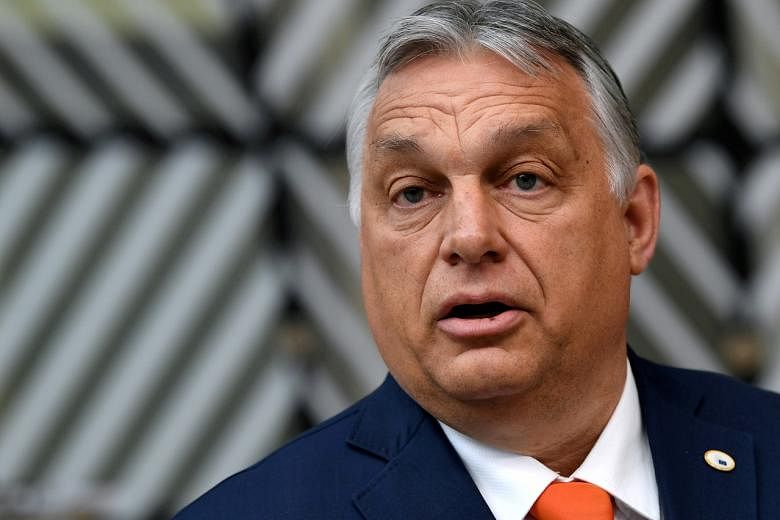BUDAPEST (BLOOMBERG) - Prime Minister Viktor Orban proposed a referendum to push back against European Union pressure to change a Hungarian anti-LGBTQ law that sparked a furious reaction in the bloc, including calls to cut off the nation's funding.
The move suggests Mr Orban, facing the most closely-fought parliamentary election since he started an unbroken stretch as premier in 2010, is digging in his heels in Hungary's fight with the EU over democratic values and making the issue central in next year's vote.
It may also reduce the chance that billions of euros in EU pandemic funds will be released quickly.
"When the pressure on our homeland is so great, then only the will of the people is able to defend Hungary," Mr Orban said in a Facebook post on Wednesday (July 21).
The announcement comes as the four-term Hungarian leader is under fire for reportedly deploying invasive spyware to monitor critics, including journalists, lawyers, an opposition politician and a media tycoon.
Hungary was the only EU country named to have purchased the Pegasus surveillance tool from Israel's NSO group.
The government hasn't confirmed or denied the reports.
The referendum will include five questions, including whether "small children should be exposed to limitless content that influences their sexuality" or whether "small children should be exposed to media content showing gender change", Mr Orban said.
Opposition parties urged Hungarians to boycott the planned plebiscite, a strategy that has undermined Mr Orban in the past, saying the questions amounted to a bid to distract voters from the spyware scandal.
The proposed questions also appeared to skirt addressing the EU's objections, which focus on alleged discrimination rather than child protection, which Brussels has said was crucial in all member states.
Referendum questions need to be approved by the state election board, likely a formality for Mr Orban, who's stacked independent institutions with loyalists. For it to be binding, at least 50 per cent of eligible voters must cast a ballot.
Getting more than half the population to vote will likely be the biggest challenge.
Still, while Mr Orban failed to exceed the threshold on a referendum against EU refugee quotas in 2016, he nonetheless continued to oppose it and ultimately won the next election by focusing on the issue.
With the LGBTQ law, Hungary outlawed media content to minors that authorities deem to "promote homosexuality", the latest in a wave of legislation targeting the LGBTQ community.
Mr Orban's government has already effectively banned adoption for same-sex couples and scrapped the right to have legal recognition of gender change.
The EU has started legal action against Hungary on the LGBTQ law and decided against authorising the distribution of pandemic funding over concerns about judicial independence and corruption. Mr Orban's government says the issues are not linked.
The EU won't approve Hungary's 7.2 billion euros (S$11.59 billion) in stimulus funding as long as Mr Orban doesn't roll back a judicial overhaul, which gave him sway over parts of the court system, and doesn't give guarantees to step up its fight against graft related to EU funds, Hvg.hu news website reported on Tuesday, citing an interview with EU Justice Commissioner Didier Reynders.

